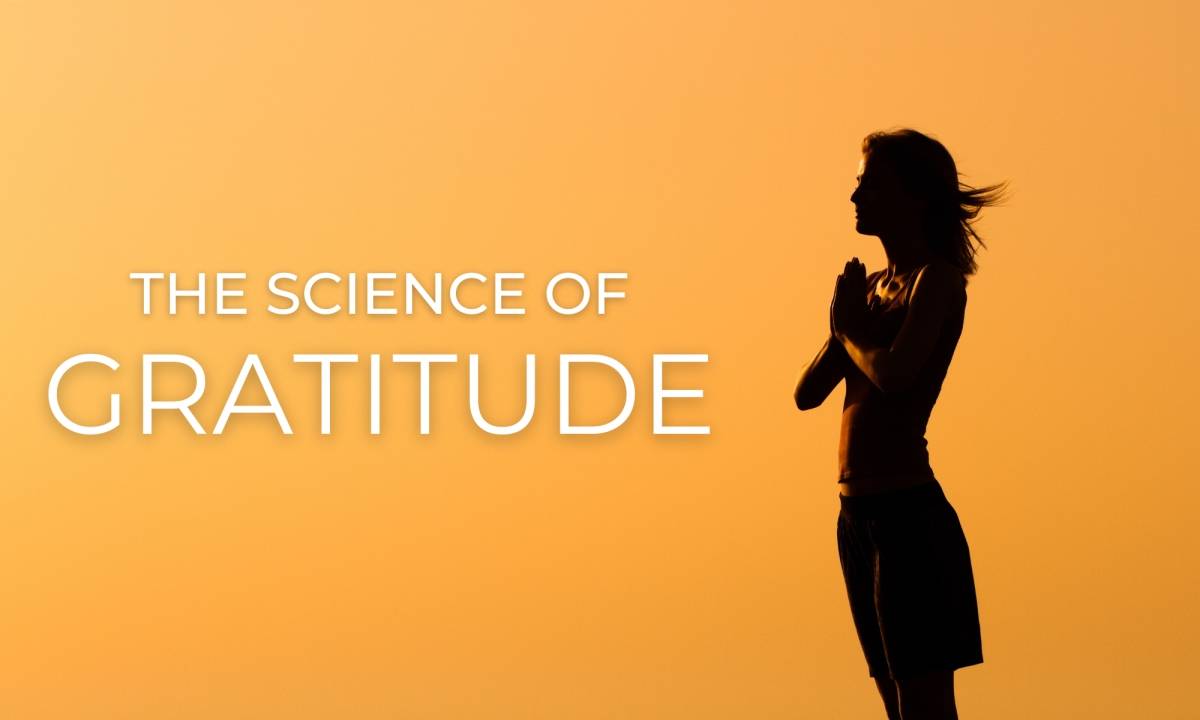
It's More than Just "Positive Thinking"
The suggestion to cultivate gratitude seems to appear everywhere these days. This widespread exposure from news to print to social media could trivialize this essential experience if you’re not careful. Allowing this to happen would be a mistake because there is a body of evidence demonstrating the benefits of this quality on mind, body, and emotion.
In this article, we’ll dive into the science of gratitude, revealing the measurable improvements you will experience if you make this quality more than just an idea but rather a practice.
The Real Benefits of Gratitude with the Science to Back it Up...
The word gratitude is defined by Oxford Languages as “the quality of being thankful; readiness to show appreciation for and to return kindness.”
This definition contains two components, a positive personal felt experience of goodness and a social component where you desire to share it. At a glance, being more likely to experience appreciation and behave in a kind manner could yield a multitude of benefits ranging from improved personal relationships to more civil and fair society.
Digging a little deeper, we discover ample evidence that gratitude is a major game-changer in terms of quality of life. The benefits include, but are not limited to:
- Improved Emotional Wellbeing
- Decreased Mental Disorders
- Improved Relationships
- Greater Physical Health
- Increased Happiness
1. Improved Emotional Well Being
Looking at the world with a focus on the good, the beautiful, and the meaningful adds depth and dimension to life. Having a heart that is open, appreciative, and thankful facilitates this. In addition, this attitude has the protective effect of improving emotional resilience and overall wellbeing.
According to Psychology Today, numerous studies in neuroscience demonstrate gratitude circuits in the brain that when conditioned by regular use (i.e. practice), lead to increases in resilience, more positive emotional states, better immune and cardiac function, and longer life. (1)
Those are some serious things to be thankful for, as well as compelling reasons to get practicing.
2. Decreased Mental Disorders
If you have a personal or family history of anxiety or depression, beginning a gratitude practice could be life-altering.
A meta-analysis for the International Journal of Depression and Anxiety showed a “robust connection between higher levels of gratitude and lower levels of depression.”(2)
This connection existed despite age, gender, or type of measurement used. In addition, a study for the journal Self and Identity showed that gratitude reduces anxiety and depression.
The authors summed up the mechanism behind this in a beautiful way, “Gratitude is a protective factor against psychopathology not only due to its association with improved relationships with others, but also because it is connected to a less critical, less punishing, and more compassionate relationship with the self.” (3)
3. Improved Relationships
It’s probably clear how having greater emotional well-being and experiencing fewer episodes of depression or anxiety could facilitate better relationships. Most people enjoy the company of others who seem balanced and high-functioning. However, gratitude appears to improve relationships in other more nuanced ways.
A study for Emotion demonstrated that gratitude has a role in the building of meaningful relationships since it helps us to “find, remind, and bind ourselves to attentive others. Relationships with others who are responsive to our whole self—our likes and dislikes, our needs and preferences—can help us get through difficult times and flourish in good times.” (4)
4. Greater Physical Health
It should go without saying, that functioning well mentally and emotionally, while sustaining meaningful relationships, promotes excellent physical health as well. We are dynamic beings impacted by all our different aspects continuously and fluidly. If we can find balance across systems, everything simply works better.
When it comes to gratitude, all systems are supported. According to WebMD, it helps to improve emotional health, promote healthy sleep patterns, improve immune function, and reduce inflammation.(5) Nothing but wins here!
5. Increased Happiness
The previous revelations should make it plain that gratitude makes life better, full stop. There simply isn’t any good reason to neglect to build this muscle for one-second longer. Getting started is as simple as incorporating the following:
-
Start the day with a smile - If you woke up today, congratulations! With 120 people dying each minute, this is indeed an accomplishment and something to be grateful for. (6) The simple act of smiling can immediately change your emotional state.
-
Take note of everything that goes right- Your clothes fit, you ate a good breakfast, your car started…
- Observe and appreciate everyday acts of kindness - Believe it or not, nice things happen all the time. People smile at each other, open doors, pick up dropped items and return them, text you silly videos just to make you laugh, etc.
- Write it down - Spend a month writing down at least one positive thing from your day. This practice solidifies and centers your thinking around goodness and amplifies gratitude.
These are only the tip of the iceberg. The practice is self-perpetuating because the rewards are quickly apparent. So, if you want to not only increase your happiness but up level your life, start your own experiments with the science of gratitude today.
References:
1. Mann, Sandi, and Jeff Thompson. “Resilience and the Practice of Gratitude.” Psychology Today, 29 March 2020, https://www.psychologytoday.com/us/blog/beyond-words/202003/resilience-and-the-practice-gratitude
2. Iodice JA, Malouff JM, Schutte NS (2021) The Association between Gratitude and Depression: A Meta-Analysis. Int J Depress Anxiety 4:024. doi.org/10.23937/2643-4059/1710024
3. Nicola Petrocchi & Alessandro Couyoumdjian (2015): The impact of gratitude on depression and anxiety: the mediating role of criticizing, attacking, and reassuring the self, Self and Identity, DOI: 10.1080/15298868.2015.1095794 http://dx.doi.org/10.1080/15298868.2015.1095794
4. Algoe SB, Haidt J, Gable SL. Beyond reciprocity: gratitude and relationships in everyday life. Emotion. 2008 Jun;8(3):425-9. doi: 10.1037/1528-3542.8.3.425. PMID: 18540759; PMCID: PMC2692821. https://www.ncbi.nlm.nih.gov/pmc/articles/PMC2692821/
5. Nicola, Stephanie. “The Benefits of Gratitude and How to Foster More Gratitude in your Life.” WebMD, 24 August 2021, https://www.webmd.com/balance/features/gratitute-health-boost.
6. “Death Rate Is 120 per Minute | Bioethics Research Library.” Bioethics Research Library, https://bioethics.georgetown.edu/2016/04/death-rate-is-120-per-minute/